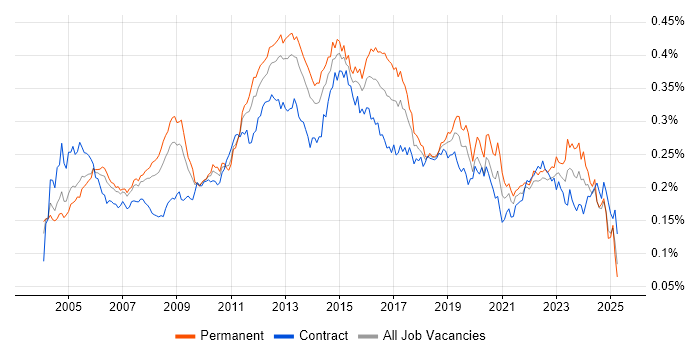Infrastructure Analyst
UK
The median Infrastructure Analyst salary in the UK is £45,000 per year, according to job vacancies posted during the 6 months leading to 9 May 2025.
The table below provides salary benchmarking and summary statistics, comparing them to the same period in the previous two years.
| 6 months to 9 May 2025 |
Same period 2024 | Same period 2023 | |
|---|---|---|---|
| Rank | 632 | 679 | 749 |
| Rank change year-on-year | +47 | +70 | +143 |
| Permanent jobs requiring an Infrastructure Analyst | 58 | 227 | 226 |
| As % of all permanent jobs advertised in the UK | 0.11% | 0.23% | 0.22% |
| As % of the Job Titles category | 0.12% | 0.24% | 0.24% |
| Number of salaries quoted | 48 | 191 | 196 |
| 10th Percentile | £36,250 | £32,500 | £31,250 |
| 25th Percentile | £39,750 | £35,375 | £36,250 |
| Median annual salary (50th Percentile) | £45,000 | £42,500 | £47,375 |
| Median % change year-on-year | +5.88% | -10.29% | +5.28% |
| 75th Percentile | £70,000 | £65,000 | £65,000 |
| 90th Percentile | £80,000 | £75,000 | £67,500 |
| UK excluding London median annual salary | £45,000 | £40,000 | £38,500 |
| % change year-on-year | +12.50% | +3.90% | -6.10% |
All Permanent IT Job Vacancies
UK
For comparison with the information above, the following table provides summary statistics for all permanent IT job vacancies. Most job vacancies include a discernible job title that can be normalized. As such, the figures in the second row provide an indication of the number of permanent jobs in our overall sample.
| Permanent vacancies in the UK with a recognized job title | 49,007 | 93,784 | 92,686 |
| % of permanent jobs with a recognized job title | 90.47% | 94.63% | 91.46% |
| Number of salaries quoted | 27,411 | 67,216 | 58,370 |
| 10th Percentile | £30,000 | £28,500 | £32,500 |
| 25th Percentile | £41,375 | £38,500 | £45,000 |
| Median annual salary (50th Percentile) | £57,500 | £52,500 | £60,000 |
| Median % change year-on-year | +9.52% | -12.50% | - |
| 75th Percentile | £75,000 | £71,250 | £81,250 |
| 90th Percentile | £97,500 | £90,000 | £100,000 |
| UK excluding London median annual salary | £52,000 | £50,000 | £53,000 |
| % change year-on-year | +4.00% | -5.66% | +6.00% |
Infrastructure Analyst
Job Vacancy Trend
Job postings that featured Infrastructure Analyst in the job title as a proportion of all IT jobs advertised.

Infrastructure Analyst
Salary Trend
3-month moving average salary quoted in jobs citing Infrastructure Analyst.
Infrastructure Analyst
Salary Histogram
Salary distribution for jobs citing Infrastructure Analyst over the 6 months to 9 May 2025.
Infrastructure Analyst
Top 15 Job Locations
The table below looks at the demand and provides a guide to the median salaries quoted in IT jobs citing Infrastructure Analyst within the UK over the 6 months to 9 May 2025. The 'Rank Change' column provides an indication of the change in demand within each location based on the same 6 month period last year.
| Location | Rank Change on Same Period Last Year |
Matching Permanent IT Job Ads |
Median Salary Past 6 Months |
Median Salary % Change on Same Period Last Year |
Live Jobs |
|---|---|---|---|---|---|
| England | -4 | 48 | £45,000 | +5.88% | 14 |
| UK excluding London | +59 | 31 | £45,000 | +12.50% | 9 |
| London | +70 | 25 | £70,000 | +7.69% | 4 |
| North of England | +9 | 13 | £45,000 | +9.09% | 2 |
| Work from Home | +76 | 11 | £65,000 | +71.05% | 4 |
| North West | +9 | 9 | £45,000 | -14.29% | 1 |
| Scotland | +133 | 8 | £52,500 | -6.25% | |
| South East | +58 | 4 | £37,500 | -1.32% | 5 |
| Yorkshire | +26 | 3 | £45,000 | +28.57% | 1 |
| South West | +94 | 2 | £50,000 | -23.08% | 1 |
| Midlands | +46 | 2 | £45,500 | +13.75% | 1 |
| East Midlands | +38 | 2 | £45,500 | +13.75% | 1 |
| North East | +48 | 1 | £37,500 | - | |
| Wales | +34 | 1 | £40,000 | +23.08% | |
| Isle of Man | - | 1 | £34,500 | - |
Infrastructure Analyst Skill Set
Top 30 Co-occurring Skills and Capabilities
For the 6 months to 9 May 2025, Infrastructure Analyst job roles required the following skills and capabilities in order of popularity. The figures indicate the absolute number co-occurrences and as a proportion of all permanent job ads featuring Infrastructure Analyst in the job title.
|
|
Infrastructure Analyst Skill Set
Co-occurring Skills and Capabilities by Category
The follow tables expand on the table above by listing co-occurrences grouped by category. The same employment type, locality and period is covered with up to 20 co-occurrences shown in each of the following categories:
|
|
|||||||||||||||||||||||||||||||||||||||||||||||||||||||||||||||||||||||||||||||||||||||||||||||||||||||||||||||||||||
|
|
|||||||||||||||||||||||||||||||||||||||||||||||||||||||||||||||||||||||||||||||||||||||||||||||||||||||||||||||||||||
|
|
|||||||||||||||||||||||||||||||||||||||||||||||||||||||||||||||||||||||||||||||||||||||||||||||||||||||||||||||||||||
|
|
|||||||||||||||||||||||||||||||||||||||||||||||||||||||||||||||||||||||||||||||||||||||||||||||||||||||||||||||||||||
|
|
|||||||||||||||||||||||||||||||||||||||||||||||||||||||||||||||||||||||||||||||||||||||||||||||||||||||||||||||||||||
|
|
|||||||||||||||||||||||||||||||||||||||||||||||||||||||||||||||||||||||||||||||||||||||||||||||||||||||||||||||||||||
|
|
|||||||||||||||||||||||||||||||||||||||||||||||||||||||||||||||||||||||||||||||||||||||||||||||||||||||||||||||||||||
|
|
|||||||||||||||||||||||||||||||||||||||||||||||||||||||||||||||||||||||||||||||||||||||||||||||||||||||||||||||||||||
